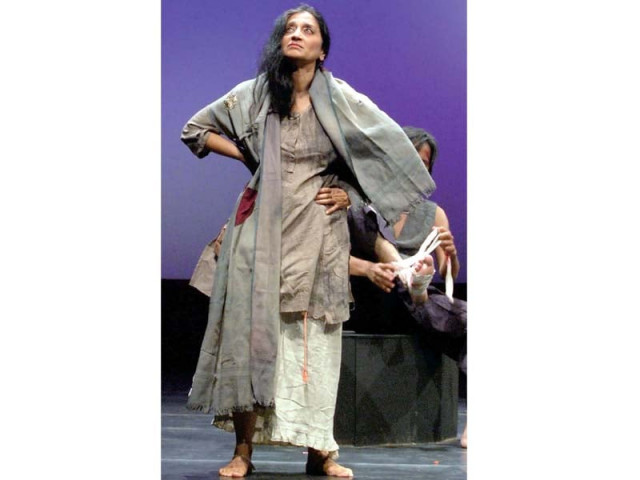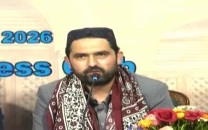National drama festival: A Pakistani twist on Beckett’s ‘Waiting for Godot’
Anwar Jafri adapts the classic English play into ‘Insha ka Intezar’.

National drama festival: A Pakistani twist on Beckett’s ‘Waiting for Godot’
Unmistakably Beckett, yet well-adapted for the Pakistani palate, “Insha Ka Intezar” hit a homerun with the audience on Friday. The play, an adaptation of Samuel Beckett’s “Waiting for Godot”, was written and directed by Anwar Jafri and did a commendable job at being relevant to Pakistani issues and ideologies, all the while harnessing the classic Beckett themes of death and decay.
For one, Beckett’s Vladimir is replaced by Zuleikha (Sheema Kermani) and Lucky is replaced by another female character, Naseeban (Shamma Askari). Interestingly, Beckett wrote female characters extremely sparingly in his plays, and “Waiting for Godot” has none, for which he was the subject of much controversy and criticism. Therefore, the very act of adapting the play for female characters sets Insha apart from the original.
But Godot’s original theme is not killed, as Zuleikha and Karmu (Saleem Miraj) are seen engaging in tragic-comic banter, while they contemplate suicide and life - classic Beckett.
Jafri has wittingly adjusted the dialogue to reflect Pakistani sensibility. For instance, Zuleikha and Karmu hurl obscenities at each other, calling each other things like “Dengue Mosquito”, “WAPDA”, “American soondi (a pest that eats crops)”, “Hudood Ordinance” etcetera, which resonated with the audience immensely, bringing out guffaws and applause.
Jafri has poignantly employed Beckett’s theatricality of keeping the audience painfully aware that they are watching a play, by sometimes indirectly addressing them and at others, folding a dramatic act within another.
Moreover, the theme of the inconsistency of memory is very well portrayed with Mansha’s (Hafeez Ali) and Karmu’s characters, who forget things and events, respectively. Even Zuleikha, who seems the most sane, has her memory dwindling when Insha’s slave girl (Zara Batool) assures her that this is the first time they have met.
Insha, of course, never arrives as in the original, but Mansha, the gross doppelganger, leads to question the character of Insha himself. Both employ slaves and servants and mistreat them, even Zuleikha and Karmu themselves are seen to be tending Mansha’s needs by the end of their encounter. “Insha” might very well be a god that never arrives to those who seek him and lets them suffer.
The loose and stripped down plot of “Waiting for Godot” leaves much space for interpretation and many have interpreted “Godot” as “God” (even though it was denied by Beckett himself) and a “political leader”, and Jafri’s adaptation plays with a similar idea.
The performances of all the actors were outstanding and refined, indicating that they not only had a vivid understand of Jafri’s script and direction but also Beckett’s essence.
Published in The Express Tribune, December 25th, 2011.



















COMMENTS
Comments are moderated and generally will be posted if they are on-topic and not abusive.
For more information, please see our Comments FAQ